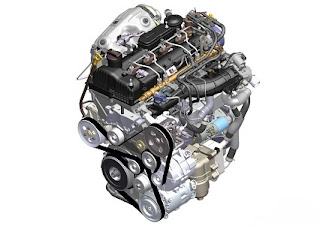Invented in Federal Republic of Germany within the Nineties by Dr. Rudolph Diesel, the ICE is understood for its outstanding pull power, longevity and fuel economy, hence its quality in trucks, buses and boats. Over the last decade-and-a-half, little diesels have become additional and additional well-liked as automobile engines -- in reality, diesels account for quite five hundredth of automobile sales in some European countries.
How diesels differ from petrol engines
Gasoline engines area unit spark-ignition engines. hydrocarbon engines attract a combination of hydrocarbon and air, compress it, then ignite it with an electrical spark; the ensuing explosion produces power. Diesel engines area unit compression-ignition engines. Diesels attract a charge of air, compress it to extend its pressure and temperature, and so spray in fuel (a less-refined and less-volatile sort of petroleum). the new compressed gas ignites the fuel, and also the ensuing combustion and growth produces power.
Merits of diesel engines:
- Fuel economy: Diesel cars will simply approach the fuel economy of a hybrid while not mileage-boosting devices like machine shut-off systems and low rolling resistance tires.
- Torque: Diesels turn out several torsion (pulling power) at low engine speeds; alittle four-cylinder diesel will simply turn out the maximum amount torsion as a bigger six-cylinder ICE, and at lower engine speeds. This sturdy mid-range torsion provides diesel cars wonderful passing power, tho' 0-60 acceleration usually feels slower. power unit ratings for diesels tend to be lower, as a result of power unit could be a perform of speed and diesels have lower most (red line) speeds than petrol engines. Diesels area unit engineered from heavier parts and so cannot spin as quick.
- Longevity: Diesels area unit less susceptible to wear than hydrocarbon engines. heavy-duty truck engines can usually run 1,000,000 miles between overhauls, and diesel cars usually run well past 300,000 miles with no major engine issues.
- Alternative fuels: in contrast to hydrocarbon engines, diesels will run on non-petroleum-based fuel (bio-diesel) with no major modifications. several makers support operation on bio-diesel mixes up to twenty (20% bio-diesel/80% petroleum-based diesel) while not excretion the manufacturer's warranty; but several diesel homeowners run 100 percent bio-diesel with no issues. Some diesels may be regenerate to run on pure oil with solely minor modifications.
- Safety: fuel is a smaller amount volatile than hydrocarbon, and can solely ignite underneath severe pressure and/or terribly high temperatures. that produces fuel safer to handle, and reduces the prospect of a fireplace or explosion ought to the fuel tank rupture in a very crash.
Demerits of diesel engines:
- Noise: in contrast to hydrocarbon engines, that turn out most of their noise from the easily-muffled system, most diesel noise comes from the engine itself. Diesel vehicles use several sound insulation to melt the characteristic diesel clatter.
- Expense and weight: Diesel engines use a lot of higher compression ratios than hydrocarbon engines; they compress combustion air to regarding 1/20th of its original volume (as critical hydrocarbon engines, that compress their fuel-air mixtures to around 1/8th to 1/12th of its original volume). Therefore, they need to be stronger than hydrocarbon engines, that makes them heavier and costlier to make.
- Emissions: Though the ICE was fictional spill a century ago, very little attention was paid to emissions till recently. many contemporary diesel cars think about diesel exhaust fluid (DEF or "AdBlue"), a urea-based resolution that has ammonia to cut back the diesel engine's emissions. these cars have a tank that should be refilled each 15,000 to 30,000 miles; per independent agency laws, if the tank runs dry, the engine is disabled.
- Messy fuel:Fuel is greasy, smelly, and might be troublesome to scrub off of hands or garments. (Some diesel homeowners carry gloves to wear whereas supplying.) fuel does not evaporate as pronto as hydrocarbon, that the ground around diesel pumps is commonly slick, and following fuel into the automobile will create the inside smell dangerous.









